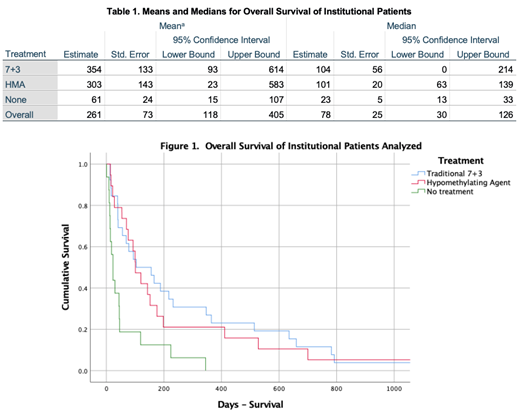Rationale: Treatment of acute myelogenous leukemia (AML) remains a challenge in elderly populations, those with comorbid conditions, and patients with poor performance status indices. The optimal choice for induction therapy as well as further agent selection is unclear, and current guidelines recommend enrollment in a controlled clinical trial.
Methods: Institutional cases of AML via an electronic medical record query performed in November 2017 containing cases of AML in patients 65 years of age or greater from 01/01/2000 to 06/21/2017 were extracted. Instances of acute myelogenous leukemia were identified by ICD codes. Age, gender, induction therapy, cytogenetics, molecular analyses, and overall survival were collected.
Results: A total of 61 cases of AML in patients aged 65 or greater were identified, with those having incomplete data being excluded from analysis. The mean age of included patients was 78.9 years of age, 35 were male and 26 were female. 60 confirmed deaths were recorded. 26 patients received conventional 7+3 (42.6%), 22 received a hypomethylating agent (HMA) (31.1%), 16 (26.2%) did not receive treatment.
Conclusion: Our institutional data showed overall survival was significantly longer when treated with 7+3, 354 days (95% CI [93, 614]), vs. 61 days (95% CI [15, 107]). Similarly, OS was significantly longer when treated with HMA, 303 days (95% CI [23, 583]). Risk of death, accordingly, was as follows: 7+3 HR .347 (.179-.672), HMA HR .348 (.173-.703). Our institutional mortality data reasonably reflected SEER data analysis reported by Medeiros et al concerning untreated patients, but trended toward a greater OS for those treated with 7+3 or HMA. Registry data, as well as our institutional data, demonstrate a survival benefit to intensive chemotherapy and palliative chemotherapy, while controlled trials have not shown this benefit consistently in elderly populations. Practices regarding induction therapy vary greatly between institutions. Determination of which elderly patients to treat with intensive therapy remains difficult.
References:
Almeida AM, Ramos F. Acute myeloid leukemia in the older adults. Leuk Res Rep. 2016;6:1-7.
Eleni LD, Nicholas ZC, Alexandros S. Challenges in treating older patients with acute myeloid leukemia. J Oncol. 2010;2010:943823.
Medeiros BC, Satram-hoang S, Hurst D, Hoang KQ, Momin F, Reyes C. Big data analysis of treatment patterns and outcomes among elderly acute myeloid leukemia patients in the United States. Ann Hematol. 2015;94(7):1127-38.
Chisti:Eli Lilly: Speakers Bureau; Medscape: Honoraria; UpToDate: Honoraria.
Author notes
Asterisk with author names denotes non-ASH members.


This feature is available to Subscribers Only
Sign In or Create an Account Close Modal